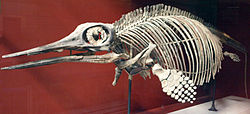Ophthalmosaurinae: Difference between revisions
by Georg Baur |
Updated figure caption with specimen numbers |
||
| Line 5: | Line 5: | ||
| image = OphthalmosaurusIcenius-NaturalHistoryMuseum-August23-08.jpg |
| image = OphthalmosaurusIcenius-NaturalHistoryMuseum-August23-08.jpg |
||
| image_upright = 1.15 |
| image_upright = 1.15 |
||
| image_caption = ''Ophthalmosaurus icenicus'' |
| image_caption = Composite skeleton (NHMUK PV R3702, R3893, R4124) of ''Ophthalmosaurus icenicus'' at the [[Natural History Museum, London]] |
||
| taxon = Ophthalmosaurinae |
| taxon = Ophthalmosaurinae |
||
| authority = [[Georg Baur|Baur]], [[1887 in paleontology|1887]] |
| authority = [[Georg Baur|Baur]], [[1887 in paleontology|1887]] |
||
Revision as of 13:27, 29 April 2024
| Ophthalmosaurines Temporal range: Middle Jurassic-Early Cretaceous,
| |
|---|---|

| |
| Composite skeleton (NHMUK PV R3702, R3893, R4124) of Ophthalmosaurus icenicus at the Natural History Museum, London | |
| Scientific classification | |
| Domain: | Eukaryota |
| Kingdom: | Animalia |
| Phylum: | Chordata |
| Class: | Reptilia |
| Order: | †Ichthyosauria |
| Family: | †Ophthalmosauridae |
| Subfamily: | †Ophthalmosaurinae Baur, 1887 |
| Genera | |
Ophthalmosaurinae is an extinct subfamily of ophthalmosaurid thunnosaur ichthyosaurs from the Middle Jurassic to the late Early Cretaceous (Bajocian - Albian) of Europe, North America and South America. Currently, the oldest and the basalmost, known as ophthalmosaurine is Mollesaurus from the early Bajocian of Argentina. Ophthalmosaurines were characterized by a large extracondylar area of the basioccipital in the form of a thick and concave peripheral band, posterodistally deflected ulnar facet of the humerus, large ulna with concave and edgy posterior surface and ischiopubis with obturator foramen.[1]
Phylogeny

Ophthalmosaurinae was named in 1887 by Georg Baur. It is a stem-based taxon defined phylogenetically for the first time by Fischer et al. (2012) as "all taxa closer to Ophthalmosaurus icenicus than to Platypterygius hercynicus". The cladogram below follows Fischer et al. 2012.[1]
The following cladogram shows Ophthalmosaurinae, according to the analysis performed by Jacobs and Martill (2020).[2]
| Ophthalmosauria |
| ||||||||||||||||||||||||||||||||||||||||||||||||
References
- ^ a b Valentin Fischer; Michael W. Maisch; Darren Naish; Ralf Kosma; Jeff Liston; Ulrich Joger; Fritz J. Krüger; Judith Pardo Pérez; Jessica Tainsh; Robert M. Appleby (2012). "New Ophthalmosaurid Ichthyosaurs from the European Lower Cretaceous Demonstrate Extensive Ichthyosaur Survival across the Jurassic–Cretaceous Boundary". PLOS ONE. 7 (1): e29234. Bibcode:2012PLoSO...729234F. doi:10.1371/journal.pone.0029234. PMC 3250416. PMID 22235274.
- ^ Jacobs, Megan L.; Martill, David M. (2020). "A new ophthalmosaurid ichthyosaur from the Upper Jurassic (Early Tithonian) Kimmeridge Clay of Dorset, UK, with implications for Late Jurassic ichthyosaur diversity". PLOS ONE. 15 (12): e0241700. Bibcode:2020PLoSO..1541700J. doi:10.1371/journal.pone.0241700. PMC 7725355. PMID 33296370.








